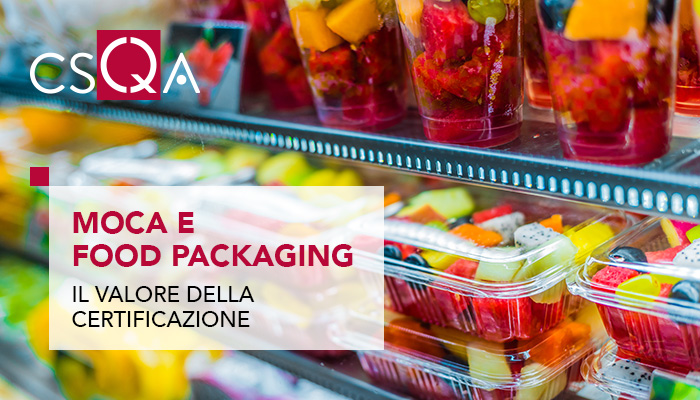
The ability of the packaging material to protect the products it covers and to keep their characteristics unaltered is all the more crucial in food packaging and, specifically, for FCMs, Materials and Objects in Contact with Food. We are talking about materials responsible for the integrity and functionality of the content whose properties they must keep intact during the entire movement, from transport to storage and logistics for as long as necessary.
The super partes guarantee of accredited certification plays a fundamental role in this area, because it promotes the quality and safety of food, the free trade of food products all over the world and gives confidence to the market, also promoting the competitiveness of companies. Stefania Scevola , Technical Officer and Inspector of Accredia's Certification and Inspection Department explains it in the article “The faces of packaging and the value of accredited certification” published in the journal Food ingredients .
MOCA and European legislation
In packaging , the traceability obligation is established by EC Regulation 1935/2004 which involves materials and objects intended to come into contact with food products.
As regards FCMs, which include not only the primary packaging material of food but also the various surfaces with which the food comes into contact , the Legislator has made available a package of specific rules. In fact, companies that want to operate in this sector must adopt a documented quality control system, as specified by EC Regulation 2023/2006 . The methods of communicating the suitability of these materials and objects, such as the presence of an accompanying Declaration of Conformity, are instead governed by EC Regulation 1935/2004 .
There is also specific legislation on some components used in the production of FCMs, such as EU Regulation 831/2018 on plastic materials, which amends and supplements EU Regulation 10/2011 and introduces changes relating to the list of substances authorized in the event of direct contact with foodstuffs. Conversely, the EC Regulation 450/2009 expresses itself on the absorption in food of active and intelligent substances and materials, which prolong their shelf life.
Standards and certifications for food packaging
The certification is accredited when it is issued by a body that has obtained accreditation because it has passed the assessment of competence and impartiality of a national body recognized in its own country, such as Accredia in Italy. The accredited certification in the packaging sector consists of different certification schemes, applicable to food safety management systems or related to product compliance. The private schemes of the British Retail Consortium (BRC) and International Food Standard (IFS) , for example, are among the pioneers of product certification rules in terms of food safety.
There are also schemes applicable to food safety management systems. This is the case of the ISO 22000 "Food safety management systems - Requirements" and FSSC 22000 "Food Safety System" certification schemes, which allow all companies involved in the food chain to precisely identify the risks to which they are exposed and to manage them effectively. The purpose of these technical standards was to harmonize the approach to safety along the entire food chain at an international level, combining the principles of HACCP with a process approach, implemented through Risk Based Thinking and the Plan Do Check Act Cycle.
There are also certification schemes owned by certification bodies , created by the scheme owners to provide restrictive requirements on the controls to be carried out and to have a guarantee on the safety of materials in contact with food and, therefore, on the food itself.
Accreditation and trust in the market
Accreditation is a service recognized at a European level, through the EC Regulation 765/2008, and at an international level, based on the mutual recognition of accredited certifications. The international agreements Multilateral Agreements (MLA) of European co-operation for accreditation (EA) and International Accreditation Forum (IAF) in fact favor the free trade of products with the same characteristics all over the world, because they have been verified in a homogeneous way and certified in compliance with the same standards.
The added value of an accredited certification is therefore connected to the fact of providing a third-party verification of the good work of a company, to which is added the accreditation factor, which also offers an opinion on the work of the third party, or rather on the laboratories and bodies that carry out the verifications, through the attestation of their competence and independence.
A mechanism that represents the means and the end for giving value to products, in terms of quality and safety , fostering trust in the market and supporting companies in remaining competitive, also promoting exports. (Source: https://www.accredia.it /)